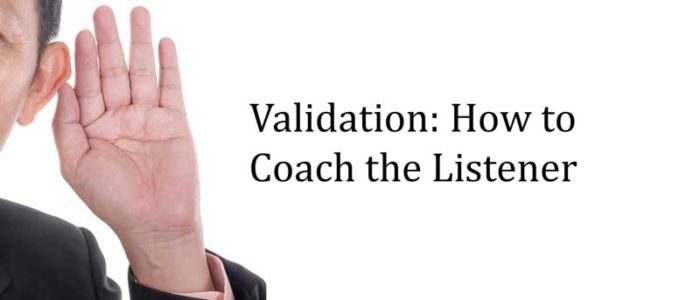Validation: How to Coach the Listener
Help Someone Listen to Their Spouse
I was speaking with a woman about a problem that I was having. She asked me my perspective and I was trying to put it into words. Then, she paraphrased back was I just said. From deep in my gut my reaction was, “Yes, that’s it exactly.”
It felt so good to be understood.
It’s funny, because I knew exactly the technique that she was using. It’s was still effective and it helped me to better understand my feelings.
When we coach couples on how to validate each other, we have some rules for the listener.
Rule #1: Put Your Reaction on Hold
When we hear something, especially something that might be a complaint, it’s easy to immediately jump to poor behaviors like defensiveness, criticism, dismissing, stonewalling, etc.
I explain that I go into these discussions with my wife knowing that I might have to “take one on the chin.” If I prepare myself ahead of time, it’s much easier for me to hold my reactions.
When I explain it in this way, it seems to help some people to be able to prepare themselves mentally.
Rule #2: Seek to Understand
We explain that the listener is in an understanding role. That doesn’t mean that they only listen. The listener can ask questions and clarify the answers.
Sometimes the speaker doesn’t quite know what they are thinking or feeling. Hearing it repeated to them or having someone ask clarifying questions helps the speaker to think it through.
It’s all about understanding.
Rule #3: Listen for Thoughts and Feelings
We clarify this for couples because they often get caught up in the words. What’s your partner thinking? What are they feeling?
Some people aren’t very good at expressing feelings. Feelings may not be expressed verbally. It helps if the listener can pick up on feelings below the surface.
Rule #4: Paraphrase Back What You Hear
Use tentative statements to reflect back the message the speaker if sharing.
Examples:
| Tentative Opening | Feeling | Feeling About, Because or When | Thought |
|---|---|---|---|
| It sounds like | you feel mad | about | how I disciplined the kids. |
| I hear you saying that | you feel sad | because of | what she said to you. |
| If I hear you correctly | you feel glad | when | your sister succeeds. |
| You seem to be saying | you feel afraid | about | your father’s health. |
| Am I hearing you say | you feel lonely | when | I don’t make time for you? |
When the listener isn’t skilled at this technique, they tend to parrot back the words. As they gain more skill, they can start to speculate on what is happening. For example, one person may say, “I disagreed with my co-worker today.” The listener could say, “It sounds like you’re worried about his reaction.” That may or may not be true, but it can help to draw the speaker out.
Good listeners are also able to extend it to other feelings.
Speaker: “Why didn’t you stop at the store?”
Listener: “I hear you are angry. Are you also afraid that it won’t change?”
That may or may not be true, but it can help a speaker to think about it.
Rule #5: Understanding Doesn’t Mean Agreement
People often need to be reminded that just because they understand an issue doesn’t mean that they agree. Both the speaker and listener need keep that in mind. They are both allowed to have their perspective.
Once someone is understood, the roles change. The listener gets the chance to speak and to express their thoughts and feelings.
Tips for Marriage Mentors:
- Have the Speaker Hold Something – Some couples have a difficult remembering who is in the speaking role and who is listening. When that happens, we’ll have the speaker hold on to an object, like a pen. Then, when you switch roles, you hand the pen to the other person.
- Is There More? – We coach the listener to ask if there is more the speaker wants to say about the topic. It can help them to be sure that all the issues are being expressed. Sometimes, the most important issue isn’t the first one communicated.
- It May Feel Unnatural – We had one couple react to this training by saying, “That is freakishly unnatural.” This way of communicating will be unnatural for some people. New skills often feel unnatural. This skill is an effective technique to handle difficult conversations.
Other posts you may find valuable:





Comments are closed.